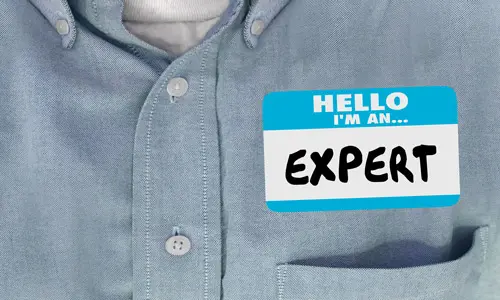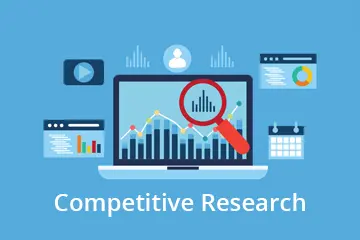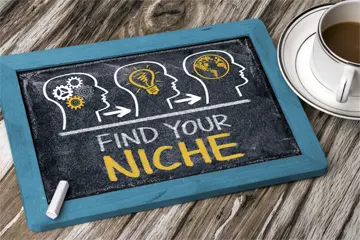How To Become An Expert
While the average person changes jobs every three years, when you change positions, it's important to be growing your skill set. Why? Because those that become experts in their field get better opportunities as they are perceived to be more valuable to a company.
Why would you want to become an expert?
- Experts are more likely to be listened to and regarded for their skills
- Experts know their industry better than anyone
- Experts can predict upcoming trends and can help position a company for success
- The media relies on experts' opinions for valuable information
- Experts have a greater opportunity to earn more money in their career
- Career opportunities seem to find experts as they are always in demand
What is an expert exactly?
Many people look at an expert as someone who spends more than ten thousand hours in a specific field, which can take you five years to obtain with a full time position. While I agree with this statement, I feel it leaves out those you would still call an expert that don't have this amount of time vested in a skill set. Let's look at the definition of an expert. An expert is someone who has a deep understanding and knowledge of a skill through practice, education and experience. Historically, an expert was someone who was referred to as a Sage or Guru. In modern times, you may not call experts by those names, but you can easily spot them when you look at their list of certifications, education, and career history. However, don't be fooled, in specific fields, an expert is established by consensus, and it is not always required for an individual to have a professional or academic qualification for them to be deemed an expert. You will find that all people seem to agree that an expert is someone who becomes a thought leader and shares their knowledge with the public. They would also say that experts never stop learning.

Scholastic Point of View
If you think of it from a scholastic point of view, how many books do you read while being traditionally taught about a subject? On average, it's one or two per class. If the average class is worth three credits, and you need 90-120 credits or 40 classes to get your bachelors degree, with up to half of those credits being general studies and not about your actual degree. This means that you spend 20 classes in your specific area of study. Or, if you look at it in another way, a student becomes a degree holder after reading 20 to 40 books on their area of study. Many of these classes exist to cover the subject area in multiple disciplines. Look at computer science, for example. These are the typical classes you'll find: Algorithms, Artificial Intelligence, Calculus, Computer Architecture, Computer Science Theory, Computer Theory, Data Logic, Data Management, Design Physics, Device Utilization, Electronic Design, Files and Databases, Information Management, Logic Design, Machine Language, Network Fundamentals, Operating Systems, Programming Languages and Statistics. Many of these classes won't even have any application to the career path that the computer science student is moving towards. In reality, only a few of these courses will even truly deal with their career path and the expert they're working towards becoming.
How do you become an expert?
For starters, start learning and keep going. It may surprise you that after you've started down the path of education and sharing your knowledge, you'll start to understand your subject matter that much more deeply. You may even be surprised at how much of an expert you become by simply reading three books on a subject. So if you want to truly understand your subject, think of how much more well-rounded you become if you were to read 10 books instead. This idea follows the thought that once you've read three or even 10 books on a subject, you now know more than 99% of people. The rest of your time spent becoming even better now only accounts for 1% of your expertise. If you really sit down and plan out time to get educated and continue your education through reading, you'll easily be able to read those 10 books within a year, if not within a few months. Most people can't focus their time long enough to read one book, let alone 10. Those ten books will really launch you forward in knowing more about a subject than 99% of people who know nothing about it and don't even want to.

Look at it this way, there are just over 329 million people in the United States. If you know more than 99% of the people, there are 325.7 million people that won't have as much knowledge as you do. You're going to be targeting that 99% with your expertise and offering them advice and help in your field. Heck, if you were to spend the next 40 years learning more about your niche, you probably won't even reach the top .01% of experts in your field. If you did, you'd be one of only 32,900 people in the US with that level of knowledge. Which would only change the number of people you know more than from 325,710,000 to 328,967,100. And that increase of people, will still probably not be part of your target audience in your day-to-day business.
To be the expert the average person is looking for, it only takes a few books to get started. The rest of the time you'll spend becoming an even better expert, but will still be able to help the 99% of people that need your services. Start reading today and gain the knowledge you need to help your target audience. As you get to know your specific audience better, you'll find the additional knowledge you'll need to assist them with more unique issues and situations. This is knowledge you wouldn't know to study about otherwise. Spend the next few months reading, and you'll be ready to start sharing what you've learned and help others resolve their problems. With this understanding, you should be able to see how easy it would be to change career paths and get to doing something you truly love.
 Pinterest
Pinterest Twitter
Twitter Facebook
Facebook

